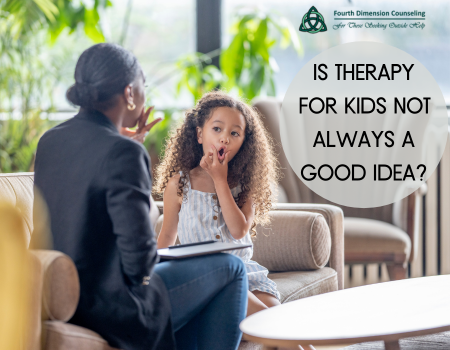In recent years, there has been a growing awareness of the importance of mental health support for children and adolescents. Therapy for kids is often advocated as a valuable tool for addressing a range of emotional, behavioral, and developmental issues. However, amidst the emphasis on early intervention and support, questions have arisen about whether therapy is always beneficial for children. While therapy can be immensely helpful in many cases, it’s essential to acknowledge the nuances and complexities involved in providing mental health care for young individuals.
The Potential Benefits of Therapy for Kids:
Therapy for children and adolescents can offer a wide range of benefits, including:
 Emotional Support: Therapy provides a safe and confidential space for children to express their feelings, concerns, and experiences. A skilled therapist can offer empathy, validation, and support, helping children navigate challenging emotions and develop healthy coping mechanisms.
Emotional Support: Therapy provides a safe and confidential space for children to express their feelings, concerns, and experiences. A skilled therapist can offer empathy, validation, and support, helping children navigate challenging emotions and develop healthy coping mechanisms.- Skill Building: Therapy equips children with essential life skills, such as communication, problem-solving, and emotional regulation. Through age-appropriate activities and interventions, therapists help children develop resilience, self-awareness, and adaptive coping strategies to navigate various challenges.
- Behavioral Management: Children may exhibit behavioral issues stemming from underlying emotional or psychological factors. Therapy can help identify and address these underlying issues, leading to improvements in behavior, social interactions, and academic performance.
- Family Dynamics: Therapy can also involve family members, providing an opportunity to address family dynamics, communication patterns, and relational conflicts. Family therapy can foster understanding, improve communication, and strengthen familial bonds, creating a more supportive and nurturing environment for the child.
Factors to Consider:
While therapy can be highly beneficial for many children, there are situations where it may not always be advisable or effective. Some factors to consider include:
- Developmental Readiness: Young children may not have the cognitive or emotional maturity to fully engage in traditional talk therapy. In such cases, play therapy or expressive therapies may be more suitable approaches to meet their developmental needs.
- Resistance or Discomfort: Children may feel resistant or uncomfortable with the idea of therapy, particularly if they perceive it as punitive or stigmatizing. It’s essential to approach therapy with sensitivity and respect for the child’s feelings and autonomy.
- Misdiagnosis or Overdiagnosis: In some cases, children may be inaccurately diagnosed with mental health conditions or pathologized for typical developmental behaviors. Overreliance on diagnostic labels without considering individual differences and contextual factors can lead to unnecessary treatment and distress.
- Cultural Considerations: Cultural beliefs, values, and norms can influence attitudes towards mental health and therapy. It’s important for therapists to consider cultural factors and adapt their approach accordingly to ensure cultural competence and sensitivity.
Alternatives and Complementary Approaches:
In cases where traditional therapy may not be suitable or preferred, there are alternative and complementary approaches to supporting children’s mental health:
- Supportive Environments: Creating supportive and nurturing environments at home, school, and in the community can promote children’s emotional well-being and resilience.
- Parent Education and Support: Providing parents with education, resources, and support can empower them to better understand and respond to their child’s needs.
- Skill-Building Programs: Participation in skill-building programs, such as social-emotional learning initiatives or extracurricular activities, can enhance children’s coping skills and emotional intelligence.
- Holistic Approaches: Incorporating holistic approaches, such as mindfulness, yoga, art therapy, or animal-assisted therapy, can offer additional avenues for children to express themselves and cultivate well-being.
While therapy can be a valuable resource for children and adolescents facing mental health challenges, it’s essential to approach it with careful consideration of individual needs, preferences, and circumstances. Therapy should be collaborative, culturally sensitive, and grounded in evidence-based practices. By taking a holistic and nuanced approach to children’s mental health care, we can better support their well-being and development in a manner that honors their unique strengths and experiences.
